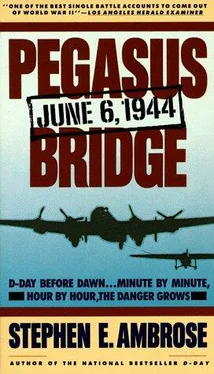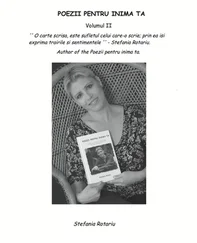Stephen Ambrose - Pegasus Bridge
Здесь есть возможность читать онлайн «Stephen Ambrose - Pegasus Bridge» весь текст электронной книги совершенно бесплатно (целиком полную версию без сокращений). В некоторых случаях можно слушать аудио, скачать через торрент в формате fb2 и присутствует краткое содержание. Жанр: История, на английском языке. Описание произведения, (предисловие) а так же отзывы посетителей доступны на портале библиотеки ЛибКат.
- Название:Pegasus Bridge
- Автор:
- Жанр:
- Год:неизвестен
- ISBN:нет данных
- Рейтинг книги:5 / 5. Голосов: 1
-
Избранное:Добавить в избранное
- Отзывы:
-
Ваша оценка:
- 100
- 1
- 2
- 3
- 4
- 5
Pegasus Bridge: краткое содержание, описание и аннотация
Предлагаем к чтению аннотацию, описание, краткое содержание или предисловие (зависит от того, что написал сам автор книги «Pegasus Bridge»). Если вы не нашли необходимую информацию о книге — напишите в комментариях, мы постараемся отыскать её.
Pegasus Bridge — читать онлайн бесплатно полную книгу (весь текст) целиком
Ниже представлен текст книги, разбитый по страницам. Система сохранения места последней прочитанной страницы, позволяет с удобством читать онлайн бесплатно книгу «Pegasus Bridge», без необходимости каждый раз заново искать на чём Вы остановились. Поставьте закладку, и сможете в любой момент перейти на страницу, на которой закончили чтение.
Интервал:
Закладка:
Wallwork could not see the bridges, not even the river and canal. He was flying by Ainsworth's stop-watch, watching his compass, his airspeed indicator, his altimeter. Three minutes and forty-two seconds into the run, Ainsworth said, 'Now!', and Wallwork threw the descending glider into a full right turn.
He looked out the window for a landmark. He could see nothing. 'I can't see the Bois de Bavent', he whispered to Ainsworth, not wanting to upset his passengers. Ainsworth snapped back, 'For God's sake, Jim, it's the biggest place in Normandy. Pay attention.'
'It's not there', Jim whispered fiercely. 'Well, we are on course anyway', Ainsworth replied. Then he started counting: '5, 4, 3, 2, 1, Bingo. Right one turn to starboard onto course'. Wallwork heaved over the wooden steering wheel and executed another turn. He was now headed north, along the east bank of the canal, descending rapidly. Using the extra large 'barn door' wing flaps, he had brought the glider from 7,000 to about 500 feet, and reduced her airspeed from 160 mph to about 110 mph.
Below and behind him, Caen was ablaze with tracers, searchlights, and fires started by the bombers. Ahead of him, he could see nothing. He hoped that Ainsworth was right and they were on target.
That target was a small, triangular field, about 500 metres long, with the base on the south, the tip near the south-east end of the canal bridge. Wallwork could not see it, but he had studied photographs and a detailed model of the area so long and so hard that he had a vivid mental picture of what he was headed towards.
There was the bridge itself, with its superstructure and water tower at the east end the dominant feature of the flat landscape. There was a machine-gun pillbox just north of the bridge, on the east side, and an anti-tank gun emplacement across the road from it. These fortifications were surrounded by barbed wire. At Wallwork's last briefing with Howard, Howard had told him that he wanted the nose of the Horsa to break through the barbed wire, which otherwise would need to be destroyed with bangalore torpedoes. Wallwork thought to himself that there was not a chance in hell that he could land that heavy, cumbersome, badly overloaded, powerless Horsa with such precision over a bumpy and untested landing strip he could barely see. But out loud he assured Howard he would do his best. What he and Ainsworth thought, however, was that such a sudden stop would result in 'a broken leg or so, maybe two each'. And they agreed amongst themselves that if they got out of this caper with only broken legs, they would be lucky.
Along with the constant concern about his location, and with the intense effort to penetrate the darkness and clouds, Wallwork had other worries. He would be doing between 90 and 100 mph when he hit the ground. If he ran into a tree, or an anti-glider pole, he would be dead, his passengers too injured or stunned to carry out their task. And the parachute worried him, too. It was in the back of the glider, held in place by Corporal Bailey. Wallwork had agreed to add the parachute at the last minute, because his Horsa was so overloaded and Howard refused to remove one more round of ammunition. The idea was that the arrester parachute would provide a safer, quicker stop. Wallwork feared that it would throw him into a nose-dive.
The control mechanism for the chute was over Ainsworth's head. At the proper moment, he would press an electric switch and the trapdoor would fall open, the chute billow out. When Ainsworth pressed another switch, the chute would fall away from the glider. Wallwork understood the theory; he just hoped he would not have to use the chute in fact.
At 0014 Wallwork called over his shoulder to Howard to get ready. Howard and the men linked arms and brought their knees up, following normal landing drill. Everyone knew the floor of the glider would disintegrate on landing. Most everyone thought the obvious thoughts - 'No turning back now', or 'Here we go', or 'This is it'. Howard recalled, 'I could see ole Jim holding that bloody great machine and driving it in at the last minute, the look on his face was one that one could never forget. I could see those damn great footballs of sweat across his forehead and all over his face.'
Gliders 2 and 3 were directly behind Wallwork, at their one-minute intervals. The other group of Horsas was, however, now split up. Friday's no. 4 glider had gone up the River Dives rather than the Orne River. Seeing a bridge over the Dives at about the right distance inland, the pilot of no. 4 glider was preparing to land. The other two Horsas, on the correct course, headed up the Orne River. They had a straight-in run. They would 'prang', a gliderman's term for touch-down, pointed south, along the west bank of the river, in a rectangular field nearly 1,000 metres long.
Brigadier Poett finally got his hatch open (in another of those Albemarles one of Poett's officers fell out while opening his hatch and was lost in the Channel). Standing over the hole in the floor of the bomber, a foot on each side, Poett could not see anything. He flew right over the Merville Battery, another critical target for the paras that night. Another minute and it was 0016 hours. The pilot flipped on the green light, and Poett brought his feet together and fell through the hatch into the night.
On the canal bridge. Private Romer and the other sentry were putting in another night of routine pacing back and forth across the bridge. The bombing activity up at Caen was old stuff to them, not their responsibility and not worth a glance. The men in the machine-gun pillbox dozed, as usual; so did the troops standing-to in the slit trenches. The anti-tank gun was unmanned.
In Ranville, Major Schmidt opened another bottle of wine. In Benouville, Private Bonck had finished his wine and had gone into the bedroom with his prostitute. He unbuckled his belt and began to unbutton his trousers as the woman slipped out of her dress. On the road from Ouistreham, Sergeant Hickman and his group in the staff car sped south, towards Benouville and the bridge. At the cafe, the Gondrees slept.
Wallwork was down to 200 feet, his airspeed slightly below 100 mph. At 0015 he was halfway down the final run. About two kilometres from his target, the clouds cleared the moon. Wallwork could see the river and the canal - they looked like strips of silver to him. Then the bridge loomed before him, exactly where he expected it. 'Well', he thought to himself, 'Igotchanow.'
CHAPTER TWO
D-Day minus two years
Spring, 1942, was a bad time for the Allies. In North Africa, the British were taking a pounding. In Russia, the Germans had launched a gigantic offensive, aimed at Stalingrad. In the Far East, the Japanese had overrun the American and British colonial possessions and were threatening Australia. In France, and throughout Western and Eastern Europe, Hitler was triumphant. The only bright spot was that America had entered the war. But to date that event had produced only a few more ships, and no troops, no planes, hardly even an increased flow ofLend-Lease supplies.
Throughout much of the British army, nevertheless, boredom reigned. The official phoney war was from September of 1939 to May of 1940, but for thousands of young men who had enlisted during that period, the time from spring, 1941 to the beginning of 1944 was almost as bad. There was no threat of invasion. The only British army doing any fighting at all was in the Mediterranean; almost everywhere else, duties and training were routine - and routinely dull. As a result, discipline had fallen off. But discipline had suffered anyway, partly because the War Office had feared to impose it too strictly in a democracy, and partly because it was thought to dampen the fighting spirit of the men in the ranks.
Obviously, many soldiers rather enjoyed this situation: they would have been more than content to stick out the war lounging around barracks, doing the odd parade or field march, otherwise finding ways of making it look as if they were busy. But there were thousands who were not content, young men who had joined up because they really did want to be soldiers, really did want to fight for King and Country, really did seek some action and excitement. In the spring of 1942, their opportunity came: Britain had decided to create an airborne army under the command of Major-General F. A. M. 'Boy' Browning. This would be the 1st Airborne Division, and volunteers were being called for.
Читать дальшеИнтервал:
Закладка:
Похожие книги на «Pegasus Bridge»
Представляем Вашему вниманию похожие книги на «Pegasus Bridge» списком для выбора. Мы отобрали схожую по названию и смыслу литературу в надежде предоставить читателям больше вариантов отыскать новые, интересные, ещё непрочитанные произведения.
Обсуждение, отзывы о книге «Pegasus Bridge» и просто собственные мнения читателей. Оставьте ваши комментарии, напишите, что Вы думаете о произведении, его смысле или главных героях. Укажите что конкретно понравилось, а что нет, и почему Вы так считаете.




![Stephen Ambrose - Citizen Soldiers [Condensed]](/books/346737/stephen-ambrose-citizen-soldiers-condensed-thumb.webp)




